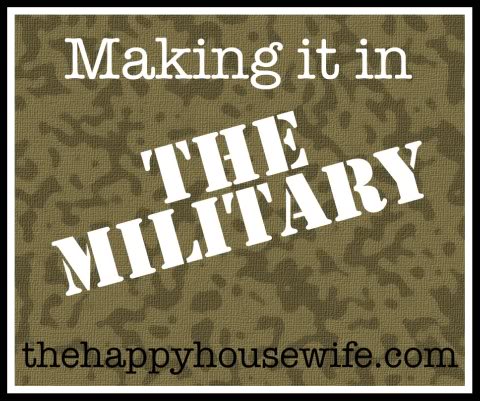
The following is a guest post from Nancy Parode of About.com. She is a military wife, and a great friend in real life. She is covering a topic near and dear to her heart and one that can be applied to any family, not just those in the military
Skills You Don’t Know You Need to Know
When I was a teenager and learning to drive, way back when in sunny southern California, my father insisted on teaching me to drive in snow during a family ski trip. I protested mightily. After all, I lived in L.A. Driving in snow and ice was a skill I would never need.
Right.
Fast forward a bunch of years, to a duty station in the mountains of West Virginia. From the moment I arrived there, other military spouses asked me whether I was worried about driving in the mountains. Uh, no, I thought – Dad taught me to drive on roads like these long ago. When winter arrived, I was ready. I memorized the shady spots on the road after my first few trips up the slush-covered mountain road, because I noticed they did not thaw out.
My husband bought snow tires for my van and helped me put together a survival kit. On super-icy days, we all stayed home. Better to be stuck indoors, we reasoned, than to risk our safety in a bad storm.
Advance Planning
I’ve always planned for natural disasters; it comes from growing up in earthquake country. I even took a class on earthquakes at UCLA (great information but too much physics). My parents taught my brother and me to develop an emergency plan, create a food pantry and carry supplies in our cars. Because you can’t predict an earthquake, the only thing you really can do is prepare. Stash some food, water and medical supplies, set up an emergency contact plan, decide what you’ll do if you get stranded and – well, that’s the best you can do.
When I married the Navy, I quickly discovered that there were other types of emergencies. First on the list was emergency evacuation of family members. At our first duty station, I attended mandatory NEO training and learned how to pack an emergency kit, plan for a nuclear attack and prepare for several days on an Italian beach, waiting for rescue. It was completely frightening, but I went home and put all of our important documents into a tote bag, discussed evacuation plans with my husband and got on with life. At every duty station since, I’ve kept our important papers in an easily-accessed box.
We Navy spouses learn fairly quickly that we need to be ready to handle natural disasters by ourselves. Why? Well, ships are very expensive to build, and the Navy prefers to keep those assets safe. Whenever a big storm threatens a Navy base, the ships put out to sea – fully manned. That’s how I lived through two hurricanes on my own. Fortunately, I had discussed all of the hurricane-related issues with my husband months before he put out to sea. Having a plan literally saved my sanity, even though it didn’t save my second-floor ceiling.
Over the last 20-plus years, I’ve lived in a brush fire area (southern California) earthquake territory (Italy), hurricane zones (Virginia), tornado country (wherever you have hurricanes, you can have tornadoes) and even a deer-infested winter wonderland (West Virginia). In each place, I’ve worked with my husband and children to create an emergency plan. My husband and son, both Boy Scouts, and my Girl Scout daughter completely understand my need to prepare. Once we have a plan and supplies, I tell them, we can sleep easily – we’ve done everything we can.
Think, Learn, Practice, Prepare
Think outside the box
My parents decided to purchase a generator, install child locks on cabinets and tether heavy items to their walls after a strong earthquake flung dishes, nail polish, paint and medications out of cupboards and drawers onto their floors. After they cleaned up the huge mess, they decided they never wanted to deal with it again.
If you’re moving into hurricane territory, walk around your property. Think about which areas might flood (basements?) and decide how you’ll secure your large windows (plywood? tape?). If your new duty station is located in Tornado Alley, decide where you’ll shelter in your home, office and out in town if a tornado forms.
Living in the mountains? Decide which roads are safest during snowstorms and make sure you have an emergency kit in each car you drive. Don’t wait until disaster strikes to think about these key survival issues; that is way, way too late.
Educate yourself
When you move to a new duty station, ask about natural disasters and other local issues. You can’t prepare if you don’t know what to expect. This is particularly important if you’re stationed overseas; you’ll need to figure out how the local emergency response system works, which words to use and how to call for help if you need it.
Consider the bad guys
You know, those terrorist people. Yes, I have a plan for a dirty bomb attack. I know how much time I will probably have to evacuate, and I know enough about wind patterns to decide on the best route at the last minute. My document box is ready; I am pretty sure I could get kids, pets and documents out the door in less than half an hour. Obviously, this won’t help if a bomb explodes down the block, but I think I’m as prepared as I can be.
Acquire essential skills
If I were in charge of the world, everyone would learn how to drive a car with a manual transmission, build a fire, practice basic first aid, cook outdoors, correctly store food and water, read a map (not a GPS unit) and drive in snow. Why? Because so many things go wrong when people try to do these things in emergency situations.
Every year people die because they try to bring their charcoal barbecues indoors during snowstorms; they don’t know that the fumes can kill them. Every time we have an ice storm where I live, horrific accidents happen because drivers don’t know how to deal with zero traction on the road and don’t have the sense to stay home. Even worse, many military folks I know find themselves stranded while on temporary or PCS orders because the only rental cars available have manual transmissions.
If you can’t drive a stick shift car, get someone to teach you. Wouldn’t you hate to be unable to reach a hospital because you couldn’t drive the only available car?
Assemble important documents
This makes more sense for military folks than for anyone else. You move every two or three years – do you know where your insurance policies are? Do you know what they cover? Where are your shot cards and medical records? What about rabies certificates for your pets? If you put all these essential items together in one place, you can lay hands on them quickly if disaster strikes.
Organize your emergency pantry
You should, at minimum, have three days’ food and water (two gallons per person per day) stashed away. You should also set aside medicines, pet food, diapers and other essential supplies. Your can opener and radio should be hand-cranked in case the power goes out for several days. The FEMA website has many excellent suggestions for anyone wanting to set up an emergency pantry. Remember to include cooking pots, utensils and fuel (charcoal, wood, etc.).
Your emergency pantry should also include cash – cash you have on hand right now. If a storm or earthquake strikes, your local ATM won’t work. How will you pay for an out-of-town hotel room or gasoline for your car without your stash of cash?
Learn to survive outdoors
That emergency pantry won’t help you if you can’t use it. Practice cooking outside – make it a family picnic – and think about how you’ll use your food and water if you’re stranded at home with no utilities for several days.
Practice
Remember grade school fire drills? You should be holding similar drills at home, preferably every month while your children are young. If an emergency arises, your training will kick in and everyone will know exactly what to do. Every time you move, make a new escape plan for your home and practice, practice, practice. This goes double for anyone stationed in tornado territory.
Making emergency responses automatic is essential if a tornado is bearing down on your home or car. You won’t have time to think about what to do. Practicing beforehand will allow your self-preservation instincts to kick in when you need them most.
Insure against disaster
If you own a home, your fire policy will protect you against most – but not all – disasters. Floods and earthquakes are special cases and you will probably need to take out special policies to insure yourself against their effects. If you live on base or rent, get a renter’s insurance policy to protect your possessions. Renter’s insurance is inexpensive compared to the cost of replacing everything you own. Be sure to ask about getting a special policy, called a “rider,” for computers, jewelry and other high-value items.
Extend your plan
Contact far-away family members and set up an emergency communications plan. Decide who will accept all the “I’m okay” calls and make sure everyone has that person’s telephone numbers. In case of a real emergency, text messaging is the best way to contact family; text messages don’t tie up the cell phone system the way voice calls do. Make sure older family members can read and send text messages; this is not an intuitive skill for many cell phone users.
In my family, everyone knows to call me if an earthquake hits; I live in a different state, one without earthquake risks, and will be able to follow up on missing family members long after their local phone service goes down. (Guess how we know? We’ve had to do this once already.)
Don’t panic (and never travel without your towel)
Douglas Adams fans will recognize this slogan, which actually offers excellent advice. If you’re prepared, know where you’ll go if you need to evacuate and have a plan for those almost-unplannable moments, you will be calm when disaster strikes. You won’t dither or worry; instead, you will switch to disaster mode and execute your plan. The towel? Very handy. Besides functioning in the obvious way, your towel can be a blanket, rain shield, sunshade, emergency beacon, pet bed, baby changing pad, pillow…let your imagination run wild.
The Bottom Line
As a military family member, you face more disaster preparedness challenges than most people ever think about. Every duty station comes with a new list of potential problems, and it’s up to you to learn about them. In the end, the difference between disaster and survival stares you in the face each morning during tooth-brushing time – and it’s you.
You can educate yourself, acquire skills, accumulate supplies and practice with your family. Even if no one else in your family wants to think about this stuff, you can help everyone prepare. And if you prepare, you will survive.





